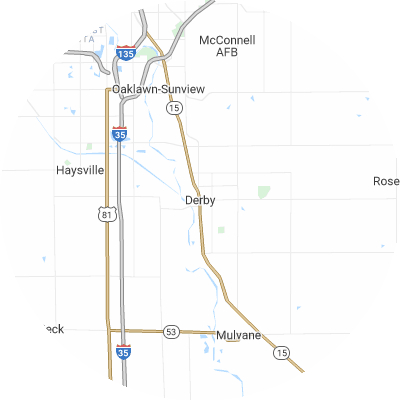Please enter a valid 5-digit zip code!
Written By David Cusick
Last Updated February 2024
Solar is one of the most easily accessible forms of renewable energy for Derby homeowners. Transitioning to solar energy can reduce your monthly energy expenses and shrink your carbon output. Before you begin the process, you want to make sure you find a reputable installer. That’s why we’ve analyzed the options and compiled a guide to the most trustworthy solar Installers in Derby. These top companies consistently deliver high-quality and reliable services.
Free quotes
Clear pricing policy
Reliable customer support
Informative resources
Services Offered
Clear pricing policy
Free quotes
Reliable customer support
Services Offered
Clear pricing policy
Reliable customer support
Informative resources
Services Offered
Today's Homeowner looks at dozens of datapoints on solar companies to come up with our data-driven rankings. It's not possible for a company to pay for preferential treatment in our rankings. We look at the following key factors in determining who should top our list:
Installing solar panels can cut your electricity costs and help the environment by reducing your carbon footprint. When evaluating if a solar provider is the best option for you, consider these key factors.
It's imperative that your solar installer has the proper licensing. This helps ensure that the work is done correctly using current best installation practices. In Kansas, the state government doesn't issue solar contracting licenses, though some cities issue and require their own licenses for projects within their borders.
Check TrustPilot, Google Reviews, the Better Business Bureau (BBB), and other review sites to see what past customers have to say about local solar installers. Detailed reviews can help you evaluate a provider's trustworthiness and customer service. Be wary of providers with few or mainly poor reviews.
Call at least three solar companies for free, itemized quotes. These quotes should describe all costs and list the solar equipment included. Reviewing multiple quotes helps identify the most cost-effective option for your budget.
Quality solar installations should come with comprehensive workmanship and performance guarantees. The workmanship warranty covers any installation problems such as cracks in the panels, poor alignment, or poor wiring. The performance guarantee promises a specific energy output level. Strong guarantees indicate that a solar installer trusts its installations.
Solar energy can help reduce your energy expenses. Be sure to consider these aspects when judging the cost and value of solar panels.
Derby homeowners typically spend about $17,256 on home solar systems after federal tax refunds. Solar arrays in Derby cost roughly $3,340 per kilowatt, with the average residential solar system being 7.4 kilowatts. A personalized estimate from a local solar provider will include costs for labor, permit fees, and preliminary work, and will account for your system's capacity, size, and panel type. Some homeowners prefer to lease solar panels in order to reduce upfront costs.
Incentive Amount:
Solar energy systems used for heating or cooling: out-of-pocket expenditures by the owner for the components and labor
Wind, hydroelectric, geothermal, solar thermal, solar PV, and other solar energy systems: the assessed value of the system
Generally speaking, a solar photovoltaic (PV) array can be used to power any household appliance or system that uses electricity. In the smallest case, you can use a solar water heater.
With home solar PV, you can save money on your energy bill, lower your home's carbon footprint, and gain additional energy independence.
It depends on where you live and what type of panels you're installing. Since there's a moderate amount of snowfall in Derby, your best time to install solar panels is in the spring and fall.
You might be pleasantly surprised at how short it takes to get a return on investment from your solar panels. In perennially-sunny Derby, you could make enough from your solar panels to recoup your investment in 9.8 years per 5 kW of rated capacity at maximum.
Yes. Solar panels exist independently from the power grid in Derby and will continue to generate power even if the grid is having problems. Bear in mind, however, that a solar system without a storage system cannot keep you running through a nighttime outage. Your contractor can discuss some economical options to keep your home's power access reliable through the worst conditions, including battery backups or an emergency generator.
When it comes to taxes, the federal government offers a tax credit of up to 30% of the panels' cost. Depending on where you live, you could also claim or apply for state or property tax incentives. Regarding insurance, your monthly premium may be slightly higher because solar panels increase your property's value. You should speak with your accountant or insurance agent for information specific to your case.
The most common types of home solar panels in Derby include polycrystalline, monocrystalline and thin-film. Monocrystalline panels are balanced and efficient, while thin-film and polycrystalline panels pair good performance with greater upfront value. Talk with your local provider about the types of solar panels they work with.
